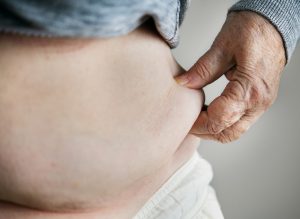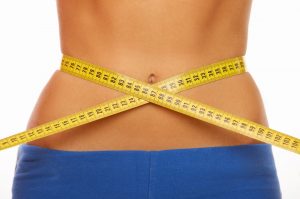OBESITY
Obesity is defined as a condition where the body has too much fat. It is of three types:
- Mild obesity
- Moderate obesity
- Severe obesity
The ideal body weight depends on your height, body type, shape and sex. You may use tables and charts of ideal weight to calculate how much you should weigh.

Obesity and HBP
The blood pressure of obese people remains high. High blood pressure strains the heart. Sustained high blood pressure thickens the ventricular walls. This leads to less efficient pumping and reduced heart function.
The adverse effect of high blood pressure on the heart can be avoided by reducing blood pressure. Reducing weight can help reduce blood pressure. Medication may also be needed.
Obesity and Diabetes
Obese persons are at a higher risk of getting Diabetes Mellitus. And as we have seen, diabetes means greater possibility of getting high blood pressure and heart disease.
Obesity and Heart Disease
As weight increases, the amount of circulating blood in the body also increases. Because of higher body weight, the heart is overworked even while the obese person is resting. The ventricles of the heart get strained, gradually thicken and later are dilated.
Other adverse effects of Obesity
Many obese people are breathless, especially when they lie supine. The reason is their large stomach presses on the diaphragm (the muscular partition between the abdomen and the chest) and so breathing activity is affected.
Can obesity lead to heart attack?
Obesity is a major risk factor for coronary artery disease.

Obese
Obesity may lead to heart attack.
Causes of obesity
- Family history
- Dietary habits
- Sedentary life
- Endocrine factors
- Injury
- Prosperity
Methods of measuring obesity
- Weight as per height
- Body mass index (BMI)
- Waist to hip ratio
- Density method
- Body composition analysis
How can you reduce weight?
|
Instead of such food |
Prefer this food |
|
Whole milk |
Toned milk |
|
PalakPanir |
Plainpalak |
|
Fruit salad with milk and sugar |
Fruits with skins |
|
French toast |
Vegetable sandwich |
|
Egg Omelette |
Boiled egg without yolk |
|
Lassi |
Buttermilk |
|
Cake |
Bread |
|
Carrot halva |
Carrot salad |
|
Ice-cream |
Fresh fruits |
|
Butter Naan |
Plain Naan |
|
Dosa |
ldli |
A part of the weight reduction diet plan comprises regulating what you eat and how much you eat. This means, you must select a low calorie diet and avoid fat and cholesterol containing food.Weight reduction also includes the following:
- Understanding about your health
- Make healthy diet a habit
- Organise a reward system for optimum food and exercise regulation
- Gradually increase your daily physical activities
Even when you are on a weight reduction diet you must ensure proper nutrition. Your diet must be varied and low in calories. This can be done by avoiding fatty foods, especially saturated fatty foods.
Pregnant women should not try to reduce their weight.
The best plan to reduce weight is a gradual change in food habits and a change in exercise habits which you can sustain for the rest of your life. The best diet plan is the one which helps you reduce your weight gradually and uniformly. This helps you reach your target weight and maintain it. Ask your health advisor about such a weight reduction plan which is safe, healthy and effective.
Selecting diet for weight reduction
Keep a diet diary. Make a note of whatever you eat or drink. A small pocket diary is more useful as you don’t miss out even the smallest item. You can go through the list of whatever you have eaten and drunk, and keep analysing your dietary habits.
Follow these tips to reduce weight healthfully
- Eat as many salads and vegetables as you want.
- If you are a non-vegetarian, take roasted or boiled meat and chicken dishes.
- Have salad with little or no salad oil or salad dressing.
- Use olive or mustard oil as they are cardio-protective.
Eat this daily but in limited quantity
- Low or fat free milk, curds and cottage cheese
- Lentils
- Fruits
Eat the following rarely
- Pure carbohydrate food like sugar
- Sugar-rich food
- Refined wheat flour (like maida)
Avoid the following as far as possible
- Saturated fat like butter
- Margarine and animal fat
- Sweetmeats, cake and cheese
- Deep fried food
- Processed meat
Counting calories
Calorie is the unit of energy obtained from food. Your body uses food to generate energy for primary functions. For diet plan and weight loss purposes, the food you eat is counted by the calories it can generate. Thus it is said, that you ‘burn’ calories when you use up energy. You obtain calories from foods like carbohydrates, proteins and fats. To reduce weight you must eat food which is nutritious, yet low in calories : nutritious food means food which is wholesome and nourishes you. So you reduce calories in your diet and also utilize more calories through exercise.
If you eat 500 calories less every day, you may lose half a kilogram weight in a week. Losing half a kilo or at the most one kg a week is ideal. Losing more than one kg a week damages your body, because you may lose muscle mass along with fatty mass in your body. Losing muscle mass is dangerous.
For most weight reduction diets, dieticians recommend 1200 to 1500 calories of food daily for women and 1500 to 1800 calories daily for men. Ask your diet or health advisor how many calories you need every day.
The rate at which you lose weight depends on your metabolic rate. Your metabolic rate is determined by the amount of energy (calories) you use for primary body functions. You can increase your metabolic rate by physical exertion.
Diet
When you begin a weight loss program, you lose weight quickly in the beginning, because you lose excess body fluids in the beginning.
While eating, sit down and relax. Avoid distractions like the phone or TV. Chew fully, this helps digestion.
Instead of two or three full meals, eating frequent small meals is beneficial. You should eat every 4-5 hours. This keeps your blood sugar at a uniform level and reduces your hunger pangs. For dessert eat a piece of fruit instead of a sweet.
Eat a balanced diet.
Popular Diets
There are many popular diets. They can be classified into many groups.
- Protein-rich diet
- Fixed meal diet
- Calorie awareness diet programs
Under the protein rich diet, the weight loss is rapid in the beginning. In such diets, an unlimited amount of protein is allowed in the beginning. Carbohydrate food is avoided.
The US Federal Drug Administration (FDA) has recorded incidents of hospitalisation due to too intense diet plans. Certain diets lead to diarrhoea, feeling unwell, too much perspiration, headache and joint pains.
Extreme low calorie diets (less than 500 calories per day) and fasting are inherently life threatening and they need medical supervision.
Protein Sparing Modified Fasting
People who are 30-40% overweight are put on protein sparing modified fasting. Before putting you on such a diet your health advisor will check your cardiovascular system. When you follow this diet you must be under the supervision of your dietician or health advisor.
